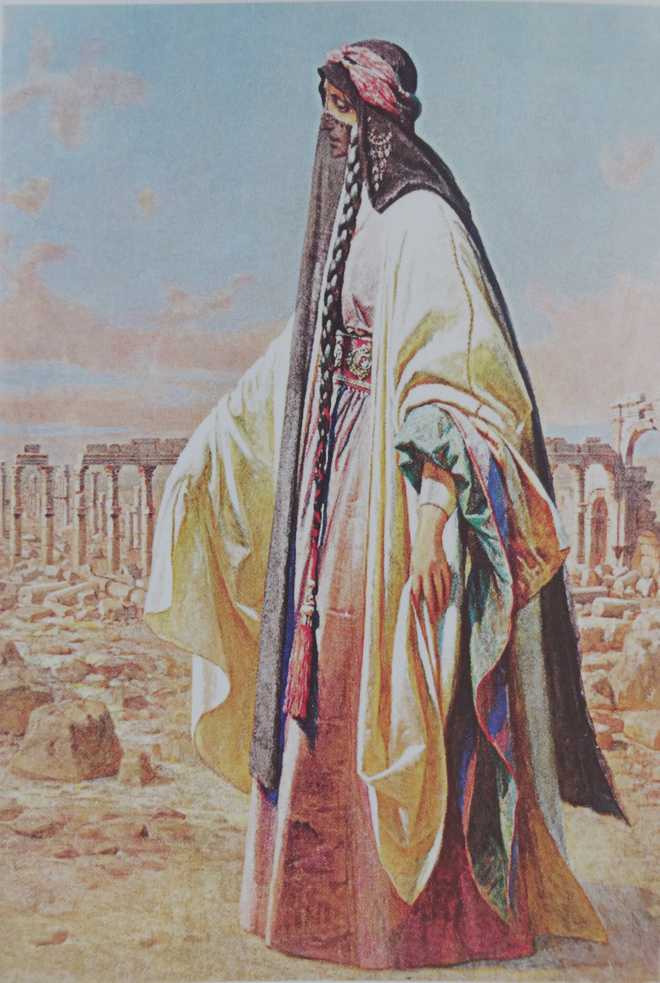
Portrait of Digby in Arab dress by Carl Haag, 1859
The misfortune of my nature is to consider love as all in all; without this feeling life is a dreary void. No earthly blessing can compensate its loss. And having at first set out in life, sacrificed all without regret to one great and absorbing passion; the necessity of loving and being loved is to me as the air I breathe and the sole cause of all I have to reproach myself with.
— Jane Digby, writing to the King of Bavaria
I had, to be candid, never heard of the Tareq Rajab Museum till some time back, even though I have been to Kuwait more than once. It was an article in the Hadeeth ad-Dar, the splendid journal of the Dar al-Athar al-Islamiyyah, run with such distinction by the admirable Sheikha Hussah, which drew my attention to it. The article spoke of the treasures of Islamic art which the Museum holds — some 30,000 objects which include calligraphy, manuscripts, ceramics, metalwork, textiles and jewellery — but also mentioned two European paintings which hang at the entrance to the Museum and which are ‘always of especial interest to visitors’. One of them is the portrait of ‘Lady Jane Digby’, and the other of her Bedouin husband, Sheikh Midjuel El-Mezrab, both painted by a German artist, Carl Haag, in 1859. The mention was intriguing, for the name Jane Digby somehow rang a bell. I decided to look her up only to find that she was an uncommon woman and that the breath of scandal seems still to cling to her name even though nearly a century and a half has passed. In accounts of hers one comes up again and again with descriptions of her ‘blond ringlets, violet eyes, creamy complexion’; a contemporary is quoted as saying that “she had blue eyes that could move a saint, and lips that would tempt one to forswear heaven to touch them”. One is reminded of those tauba-shikan beauties that Urdu poets keep writing about.
Jane Digby figures in many writings but there have been at least two salacious-sounding books devoted exclusively to her life: in 1977, Margaret Foxe Schmidt published Passion’s Child: The Extraordinary Life of Jane Digby, which her publishers promoted as “an enthralling tale of a 19th century beauty whose heart — and hormones — ruled her head”; some 20 years after that, Mary Lovell published The Scandalous Life of Jane Digby. The lady has not had much rest, one can see. All judgement apart, however — and much of it is Victorian in spirit — Jane Digby led a remarkable life: challenging, defiant, adventuresome, even filled in the later part of her life with love: the kind she sought and hankered after. Sir Richard Burton, the famous explorer and diplomat and linguist — the one who translated the Thousand and One Nights from Arabic, and Vatsyayana’s Kama Sutra from Sanskrit — described Jane, after having met her, as “the cleverest (meaning most accomplished) woman I have ever met”.
Jane’s life has been told in detail in her biographies — almost always with comment — but one can go over it in bare outline here. Born in 1807 to an aristocratic family — her father was an Admiral in the British Navy — Jane was undoubtedly beautiful, turning every head when she entered society. At a very young age, she caught the eye of Edward Law, a highly successful and well-placed bureaucrat, who later, as Lord Ellenborough, became the Governor General of India, and married him in 1824. But the marriage turned out to be love-less for her. While still married — the divorce came only in 1830 — she formed a liaison, first with a cousin of hers, and then with an Austrian diplomat, Prince Felix Schwarzenberg, from whom she had two children. But the Prince never officially owned her, which left her heartbroken. Soon, however, she moved from England to Europe, landing up at Munich where she became the lover of King Ludwig of Bavaria. In respect of marriage, however, she tied up, now that she was divorced, with Baron Karl von Venningen in 1833, who left her later, finding her being fascinated by a Greek count, Spyridon Theotokis. The marriage with Theotokis did not last either, however, and Jane, who had converted to the Greek Orthodox Church, moved to Greece, where the King, Otto, became her next lover. There, in Greece, Jane found new adventures in the company of a hero of the Greek revolution, Christodoulos Chatzipetro, “acting as the ‘queen’ of his army, living in caves, riding horses and hunting in the mountains”.
Jane’s move towards the East continued, however, and around 1852, she made a journey to Syria. There, in that land, the caravan she was travelling in once was attacked by highwaymen. But a courageous young Sheikh, Medjuel al-Mezrab, saved the caravan and her, and she, now 46 years of age, fell in love with the Sheikh, 26 years younger than her. The two got married and now, having found at last the love she had always sought, Jane abandoned the life of European luxury and decided to live in the desert: submissive to her husband, learning Arabic in addition to the eight languages she already knew, dressing in Arab-fashion, walking barefoot, milking camels and fetching firewood. She also built a house and a garden for herself in Damascus, but the desert was her real home. She died in 1881 and was buried in the protestant graveyard, with her favourite horse present. A truly remarkable life had come to an end. Little wonder then that those paintings of her and her Bedouin husband in the Tareq Rajab Museum in Kuwait remain “of especial interest for visitors”.



























